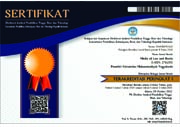Publication Ethics
Publication Ethic
Ethics publication is a statement of the code of ethics of the parties involved in the publishing process in Media of Law and Sharia, including the editor in chief and editorial members, Reviewer , and authors. This ethical guide is arranged so that the publication in the Media of Law and Sharia journal can be carried out ethically and responsibly and following applicable legal norms.
Publication ethics upholds three ethical values in publication:
- Neutrality, free from conflicts of interest in the management of publications,
- Justice by giving authorship rights to those who have the right to be authors/writers, and
- Honesty, free from duplication, fabrication, forgery, and plagiarism in publications.
Therefore, all parties involved in publishing in Media of Law and Sharia must abide by the ethics of this publication according to the role of each party.
Author
- The author sends the original manuscript, free from plagiarism.
- The author must maintain the truth, benefits, and meaning of the information submitted through the submitted manuscript to avoid misleading.
- The author must uphold the rights, opinions or findings of others. Therefore, it is necessary to refer to or review the rights, opinions or findings of others related to the manuscript of the article and must mention the source of information.
- The author must be fully aware not to commit any scientific violations, be it fabrication (making fictitious data), falsification (changing data as desired), and plagiarism (taking words or sentences or other people’s text without providing a citation reference), including self-plagiarism (duplicating one’s own work or taking part of a self-published work without citing references).
- The author must convey the information in the manuscript using standard language rules.
- The author must ensure that the name of the person listed as the author in the case of more than one author is the person who has contributed to the writing of the manuscript.
- Authors must pay attention to the journal's policies and ethics of publication and follow the writing guidelines.
- The author does not submit manuscripts submitted to the journal Media of Law and Sharia to other publications, except after a decision has been made to return the manuscript to the author.
- Authors are collectively responsible for their articles. Therefore, authors must carefully examine submitted manuscripts at each stage and section to ensure methods, analyzes and findings are reported accurately.
- The author improves the article script according to the suggestions of the Reviewer and editors.
- Authors must immediately notify the editor if they find errors in submitted, accepted or published manuscripts.
Chief editor
- The editor-in-chief must process the incoming manuscript and notify the correspondent author of the ongoing stages.
- The editor-in-chief assesses the initial feasibility of the manuscript to continue the editing process based on journal policies, publication ethics, and writing guidelines.
- The editor-in-chief distributes edits to members of the editorial board, taking into account the scientific field and performance burden.
- The editor-in-chief selects, determines, and appoints members of the Reviewer based on their expertise (does not rule out the possibility based on the editorial board’s advice).
- The editor-in-chief decides the feasibility of publishing the manuscript based on the notes of the Reviewer partner.
- The editor-in-chief must avoid conflicts of interest in processing article manuscripts due to differences in gender, ethnicity, religion, race, and group identity.
- The editor-in-chief guarantees the confidentiality of the article manuscript at the time of editing except for academic or scientific purposes and does not misuse it for personal interests.
- The editor-in-chief is responsible for the process of publishing manuscripts in the journal Media of Law and Sharia.
Editorial Board
- Editors correct and evaluate manuscripts before being reviewed by Reviewer based on journal policies, publication ethics, and writing guidelines.
- The editor corrects the manuscript by considering the standards and rules of scientific writing.
- The editor ensures that citations and references are written according to style.
- Editors must avoid conflicts of interest in correcting article manuscripts due to differences in gender, ethnicity, religion, race, and group identity.
- Editors guarantee the confidentiality of article manuscripts at the time of editing except for academic or scientific purposes and do not misuse them for personal interests.
Reviewer
- Reviewer examine article manuscripts and comments on their contents based on journal policies, publication ethics, and writing guidelines.
- Reviewer assess the feasibility of publishing the manuscript of the article being reviewed (accepted, accepted with minor revision, accepted with major revision, or rejected) based on journal policies, publication ethics, and writing guidelines.
- Reviewer must avoid conflicts of interest in researching and evaluating article manuscripts due to differences in gender, ethnicity, religion, race, and group identity.
- Reviewer guarantee the confidentiality of the article manuscript when it is reviewed except for academic or scientific interests and do not misuse it for personal interests.

